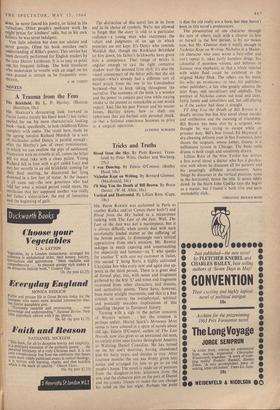Tricks and Truths
MR. PIOTR RAWICZ was acclaimed in Paris as another Kafka and/or Camus (how both?) and Blood from the Sky hailed as a masterpiece ranking with The Last of the Just. Well, The Last of the Just was not a masterpiece, but it is always difficult, when novels deal with such emotionally loaded matter as the suffering of the Jewish people, to disentangle one's critical appreciation from one's emotion. Mr. Rawicz indulges in much capering and somersaulting for objectivity and humour—an 'I' who speaks for another 'I' with says my customer in italics, this second T being Boris, a highly cultivated Ukrainian Jew who every now and again also ap- pears in the third person. There is a great deal of formal play, too, with notes and fragments gathered by the first 'I,' and notes and fragments recovered from other characters, and dreams, and surrealistic poems. There have, however, been many straight treatments, and this is a fine attempt to convey the metaphysical, spiritual and poetically macabre implications of this appalling chapter in European history. Turning with a sigh to the pettier concerns of Western writers . . . but the contrast is perhaps unfair. Muriel Spark's Memento Mori seems to have ushered in a spate of novels about old age. Edwin O'Connor, author of The Last Hurrah, now also gives us an unwanted old man, ex-variety artist once known throughout America as Waltzing Daniel Considine. He has turned up on his son's doorstep, having abandoned him for forty years, and decides to stay. After fourteen months the son has firmly given him notice and arranged for him to go to an old people's home. The novel is made up of pressure from the daughter-in-law, bitterness from the son, and the elaborate plot on the part of Daniel and his cranky friends to make the son change his mind on the last night. Perhaps the point
is that the old really are a bore, but they haven't been in this novel's predecessors.
The presentation of one character through the eyes of others, each with a chapter to him or herself in the first person, is by no means new, but Mr. Glemser does it neatly enough in Nicholas Kept on Writing. Nicholas is a Mailer- ish character who once wrote a best-seller and can't repeat it, takes fairly harmless drugs, has colourful if pointless visions, and believes in Siamese twin elephants, or that a whale injected with white fluid could be exhibited as the original Moby Dick. The others are his maid, his wife, an ex-mistress or two, his publisher, other publishers, a fan who greatly admires the later flops, odd taxi-drivers and oddballs. The portrait of Nicholas comes out loud and clear, fairly funny and sometimes sad, but self-pitying as if the author had done it straight. Sing You the Death of Bill Brown is a deadly serious but fine first novel about murder and retribution and the meaning of friendship. Bill Brown has been shot by a sergeant who thought he was trying to escape while on prisoner duty. Bill's best friend, Ed Hayward, a dry-cleaning delivery man in San Francisco, later shoots the sergeant, whose father, Green, is a millionaire tycoon in Chicago. The basic male drama is both tough and sensitively drawn. Lillian Ross of the New Yorker has written a first novel about a doctor who has a psychia- trist with whom he discusses all his patients and his amazingly diffident involvements. Some things he discusses in the vertical position, some in the horizontal, hence the title. It seems Oddly dated. In the blurb Jahn Updike says she begins as a master, but I found it both trite and quite unreadably slick.
CHRISTINE BROOKE-ROSE






























 Previous page
Previous page